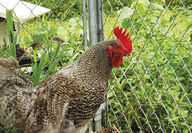Sorted by date Results 85 - 109 of 186
“There is increased interest in planting winter wheat this year and for good reason,” says Clair Keene, North Dakota State University (NDSU) Extension agronomist. “With many prevent plant acres in the state, good soil moisture heading into the end of the growing season, severe drought in much of the Southern Plains and higher wheat prices than we’ve been accustomed to the last few years, 2022 is shaping up to be favorable for growing winter wheat,” says Keene. In addition to the positive market conditions, some other benefits of planting...

U.S. Sen. John Hoeven announced a federal appropriation that will develop a partnership between North Dakota State University, the U.S. Department of Agriculture Agricultural Research Service and Grand Farm around research development and educational opportunities in agriculture technology. This announcement occurred at an event held at NDSU. "Grand Farm is about leveraging North Dakota's global leadership in agriculture and the dynamic technology sector that we've built in our state to develop...

North Dakota State University's soybean breeding program conducts research every growing season on the tolerance of soybean varieties to iron deficiency chlorosis (IDC). "If farmers had IDC in their fields this year, they should consider using the NDSU tolerance ratings generated in 2022 and previous years, to select soybean varieties for 2023, to minimize the chlorosis in their fields," says Hans Kandel, NDSU Extension agronomist. During the summer of 2022, NDSU's soybean breeding program...

"There is increased interest in planting winter wheat this year and for good reason," says Clair Keene, North Dakota State University (NDSU) Extension agronomist. "With many prevent plant acres in the state, good soil moisture heading into the end of the growing season, severe drought in much of the Southern Plains and higher wheat prices than we've been accustomed to the last few years, 2022 is shaping up to be favorable for growing winter wheat," says Keene. In addition to the positive market...

Field Days at North Dakota State University's Williston Research Extension Center (WREC) are set for July 13 and 14. The annual dryland agronomy and horticulture field day will be held Wednesday, July 13, at the center, which is 4.5 miles west of Williston on U.S. Highway 2. The event begins with registration at 3 p.m. Central time. The dryland crops tour starts at 4 p.m. NDSU research scientists will highlight their work. NDSU President, David Cook, and Greg Lardy, NDSU vice president for...

Weather conditions this spring and summer and much needed rainfall have lifted North Dakota out of drought conditions. Temperatures have been mild with a lot of cloudy and overcast days. These conditions have been great for forage growth, but they have been less than ideal for hay drying and curing, says James Rogers, North Dakota State University (NDSU) Extension forage crop production specialist at the North Central Research Extension Center, Minot. "Over the past few weeks, hay harvesting...

Extreme temperatures are expected to hit many parts of North Dakota this week, increasing the potential for heat stress in cattle, warns Karl Hoppe, North Dakota State University livestock systems specialist. "One day of heat stress is uncomfortable, but two or more days back to back without night cooling can be deadly for livestock," says Hoppe. "Signs that animals are trying to regulate their internal body temperature include an increased respiration rate, increased heart rate and increased...

Highly pathogenic avian influenza (HPAI) was confirmed in a wild snow goose in North Dakota on March 24 and in a non-commercial, backyard chicken flock in Kidder County. The North Dakota Game and Fish Department sampled a wild bird mortality in Burleigh County that was confirmed positive by the National Veterinary Services Laboratory in Ames, IA. Samples from the North Dakota flock were tested at the North Dakota State University (NDSU) Veterinary Diagnostic Laboratory and confirmed by the...
Currently 36% of North Dakota is experiencing some level of drought as drought conditions continue to persist in the western part of the state. “Drought impacts are at the forefront of many rancher’s minds as we head into the 2022 grazing season,” says Miranda Meehan, North Dakota State University (NDSU) Extension livestock environmental stewardship specialist. “Concerns linger about long-term impacts of the drought on forage production as well as the risk of a continued drought throughout the year.” NDSU specialists will be hosting live webi...

Access to adequate, good quality water will continue to be a challenge for ranchers in North Dakota this spring, according to North Dakota State University (NDSU) Extension livestock environmental stewardship specialist, Miranda Meehan. Many ranchers in the region still depend on surface water sources, such as dugouts and stock dams to provide water to grazing livestock. Due to drought conditions in both 2020 and 2021, many livestock sources either dried up or were potentially toxic to livestock...

Planning for the future can be a very frustrating process especially in times of market volatility. Planning typically pays high dividends. For most farm and ranch managers, developing realistic commodity price expectations is one of the most difficult and complex tasks of the planning process. To make the planning process easier, North Dakota State University (NDSU) Extension has released its 2022 short- and long-term agricultural planning price projections for North Dakota, says Ron Haugen,...

Farmers can elect coverage and enroll in crop-by-crop Agricultural Risk Coverage-County (ARC-CO) or Price Loss Coverage (PLC) programs within each Farm Service Agency (FSA) farm unit, or ARC-Individual for the entire farm, for the 2022 crop year, says Ron Haugen, North Dakota State University (NDSU) Extension farm management specialist. Although election changes for 2022 are optional, enrollment by signed contract is required for each year of the program. This is an annual decision that farmers...

Farmers will have the opportunity to learn more about the upcoming Agriculture Risk Coverage (ARC) and Price Loss Coverage (PLC) election and the decisions the programs entail during a webinar that North Dakota State University (NDSU) Extension and the North Dakota Farm Service Agency (FSA) are hosting on Thursday, Feb. 3, at 11 a.m. CST. The webinar will also include information on FSA's Noninsured Crop Disaster Assistance Program (NAP). The ARC and PLC sign-up period runs through March 15...

The success, dedication and hard work of outstanding agriculturists in 53 counties in North Dakota and 10 counties in Minnesota were honored during the 47th annual Harvest Bowl program at North Dakota State University on Nov. 19. Information on the outstanding agriculturists listed by county is available at https://bit.ly/2021HBCountyBios, and photos are available at https://bit.ly/2021HBHonoreePhotos. 2021 Harvest Bowl honorees by county, name and city: Adams - Jamie and Nikki Enerson,...

North Dakota State University (NDSU) Extension again will host the Field to Fork "Wednesday Webinar" series starting in February 2022. Experts from across the region will provide information about growing, preserving and preparing specialty-crop fruits and vegetables safely in this seventh annual webinar series that has reached thousands of people The "Field to Fork Wednesday Weekly Webinars" will begin Feb. 16. The webinars will be held online from 2-3 p.m. Central time through April 20. They a...

Farmers can elect coverage and enroll in crop-by-crop Agricultural Risk Coverage-County (ARC-CO) or Price Loss Coverage (PLC) programs within each Farm Service Agency (FSA) farm unit, or ARC-Individual for the entire farm, for the 2022 crop year, says Ron Haugen, North Dakota State University (NDSU) Extension farm management specialist. Although election changes for 2022 are optional, enrollment by signed contract is required for each year of the program. This is an annual decision that farmers...

The 52nd annual Sugarbeet Research Reporting Session will be held on Tuesday, Jan. 11, at the West Fargo Convention Center starting at 7:30 a.m. Researchers and Extension specialists from North Dakota State University (NDSU), the University of Minnesota, the U.S. Department of Agriculture, as well as from European research institutes and universities will provide updates on current sugarbeet research. "Each year the Sugarbeet Research and Education Board of Minnesota and North Dakota provides ge...

Drought brings many nutritional and animal health-related challenges. Cow performance issues during the grazing season may result from reduced forage quality and quantity. It is possible that cows will enter the fall and winter in lower than desired body condition score and with other potential nutrient deficiencies that may not be noticeable. Vitamin A deficiency is one potential challenge that may arise when feeding drought-affected forages, according to North Dakota State University (NDSU)...

Farmers in the western Dakotas and eastern Montana will have the opportunity to hear nationally-known speakers address topics affecting agriculture in the region during North Dakota University (NDSU) Extension's Diversity, Direction and Dollars agricultural forum. It will be held Tuesday, Jan. 11 at the Roosevelt Grand Dakota Hotel, Dickinson. The forum will provide ideas for improving productivity and decreasing costs while providing high quality food produced in a sustainable manner....
Agricultural producers should do tax planning before the end of the year. “It is that time of the year again to think about year-end tax planning,” says Ron Haugen, North Dakota State University (NDSU) Extension farm management specialist. “Generally, all or most of the government payments that farmers and ranchers received during the year must be reported as income in the year it is received,” says Haugen. “When tax planning, it is best to start with year-to-date income and expenses and estimate them for the remainder of the year,” says Haugen...

Farmers in the western Dakotas and eastern Montana will have the opportunity to hear nationally-known speakers address topics affecting agriculture in the region during North Dakota University (NDSU) Extension's Diversity, Direction and Dollars agricultural forum. It will be held Tuesday, Jan. 11 at the Roosevelt Grand Dakota Hotel, Dickinson. The forum will provide ideas for improving productivity and decreasing costs while providing high quality food produced in a sustainable manner....

The weather this year has presented many challenges. A drought that started in 2020, a frost in late May and hot, dry weather during the summer had a huge effect on crop production. "Having the ability to irrigate during droughty weather conditions makes a difference in crop production," says Tom Scherer, North Dakota State University (NDSU) Extension agricultural engineer. To help farmers with their irrigation management, NDSU Extension is holding an irrigation workshop in conjunction with the...
The weather this year has presented many challenges. A drought that started in 2020, a frost in late May and hot, dry weather during the summer had a huge effect on crop production. “Having the ability to irrigate during droughty weather conditions makes a difference in crop production,” says Tom Scherer, North Dakota State University (NDSU) Extension agricultural engineer. To help farmers with their irrigation management, NDSU Extension is holding an irrigation workshop in conjunction with the North Dakota Irrigation Association on Thu...

Producers who have relocated their cattle out of state for winter feeding this year should consider having a weed management protocol in place when the cattle return, say North Dakota State University Extension specialists. "If you have sent your cattle to areas where there are known Palmer amaranth, waterhemp or other noxious or troublesome weed issues, it will be important to allow a 'cleanout period' upon return," says Joe Ikley, NDSU Extension weed specialist. "Crop fields are not the...
Late August and September rains have left drought stressed pasture and rangeland in some areas of North Dakota looking green and lush. Leading ranchers to wonder if they should take advantage of this forage, and how grazing will influence forage production in 2022? “The answer to this question is going to depend largely on the grass species in the pasture,” says Miranda Meehan, North Dakota State University Extension livestock environmental stewardship specialist. “If the pasture is comprised of tame grass species such as brome grass or Kentu...